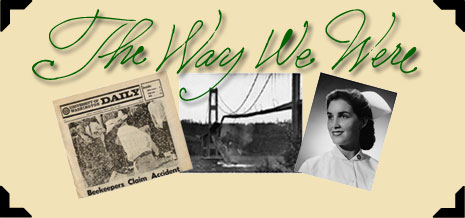

PERSONAL STRUGGLES
FDR GOT ME THROUGH COLLEGE
It was 1934, Hitler was rattling his anti-Semitic sabers, the depression was in full force, and America, "the sleeping giant" was slow to awaken to the threat. I had completed one and a half years of service in the Civilian Conservation Corps and it was idiotic to even think about going to the University, but FDR made it possible with another program called the National Youth Administration. One could earn $15 a month to pay tuition at $27.50 a quarter and have enough left over to buy an ASUW ticket to watch football.

To assist with other expenses I could wash dishes at Sweitzer's Beanery for two meals, or stay overnight with a friend, or go home to Mom and Dad in my four cylinder Plymouth with "floating power" accompanied by a couple of paying passengers in similar circumstances. Since I was enrolled as a forestry major, vacillating between there and the music department, I was able to earn additional funds by working for the Forest Service during the summer, which of course involved missing a quarter. While in their employ, I learned to cruise timber, fight fires, maintain trails, repair telephone lines, chop wood, and do lookout duty on the top of a mountain. In 1939 I finally earned my B.S. degree, an event that I have cherished for 65 years while pursuing many kinds of occupations, and have insisted that my three children do the same.
-Benton Williams, '39
WHEN WOMEN WERE SUPPOSED TO STAY HOME
In Sept. 1955, I began nursing studies at the UW. I had just turned 18, and my daughter was 6 months old. In the '50s, married women, and certainly married women with children, were expected to stay home and take care of their families. But I had graduated high school with high honors, and I'd always wanted to be a nurse.
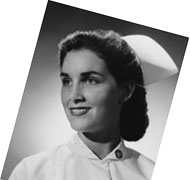
In those days, most nurses were trained in three-year diploma programs sponsored by hospitals. Students lived in hospital-owned dormitories and their education was supervised and paid for by the hospital. If a student got engaged or married she was dismissed from the program. None of these programs would consider admitting a student with a baby. University-based nursing programs were rare.
The University of Washington did not discriminate. A high school honors graduate who could afford the tuition and manage the coursework was welcome. Some faculty and staff were supportive; one even encouraged me to apply for an alumni scholarship, which I gratefully received. However, others shared the predominant cultural norms: if they learned I was married and had a baby at home, they found ways to express their disapproval. The first quarter I made an appointment with my professor to discuss ways I could better learn chemistry. He scoffed and said he was supposed to "weed out" excess nursing students. It didn't matter, anyway, because girls came to college to get their "M.R.S." degree. Bewildered, I said I didn't know what that was. He gave me an incredulous stare and said girls came to college to get married.  When I blushed and stammered that I already was married and had a baby, he was truly dumbfounded and speechless. The staff person who assisted nursing students with registration frowned sternly each quarter as I came to register for the next: hadn't I gotten pregnant again or flunked out yet? Wouldn't I consider giving up "my space" for a more "deserving student?" Some faculty directed fierce looks at me in class when they discussed the critical importance of mothers staying home with their babies to ensure their proper growth and development.
When I blushed and stammered that I already was married and had a baby, he was truly dumbfounded and speechless. The staff person who assisted nursing students with registration frowned sternly each quarter as I came to register for the next: hadn't I gotten pregnant again or flunked out yet? Wouldn't I consider giving up "my space" for a more "deserving student?" Some faculty directed fierce looks at me in class when they discussed the critical importance of mothers staying home with their babies to ensure their proper growth and development.
I graduated with a B.S.N. degree, summa cum laude (3.9 grade point average) in 1959. Strangely, although I was at the top of my class academically, I was never able to win a nursing scholarship. It made no difference that I was accepted into Phi Beta Kappa honorary in my junior year. Many years later I heard that the prevailing sentiment at the time was that married students should not receive nursing scholarships. They would probably have children and quit nursing. Not good candidates on whom to waste a nursing scholarship.
...After five years of staff nursing, I returned to the UW to earn a master's degree in nursing. Then I taught nursing for 37 years, the first three at the UW. During that time I also earned a Ph.D. in higher education at the UW. After 42 years of a full-time nursing career, I am now retired-not too bad for a student deemed unlikely to make any contribution to nursing and unworthy of a nursing scholarship.
-Linda Olson, '59
CALCULUS AGAINST THE ODDS
I entered the UW in fall 1966 as a freshman and graduated in 1970. Those years included all kinds of societal change and upheavals and protests on campus. My favorite memory is that when I was a freshman, my boyfriend, a year ahead of me, was a math major. In order to prove myself to him, I signed up for the beginning calculus class even though my major (sociology) did not require it. Much to my surprise, I liked calculus and did well at it; in fact, I got the top grade in my large class of mostly male math and science majors!  What ended up happening is that I proved something to myself, not just to my boyfriend. That class gave me the confidence to continue on and I ended up graduating Phi Beta Kappa and magna cum laude. Things were very different for women in those days, even though it was not that long ago. Help wanted ads were still sex-segregated, women at the UW had to have parental permission to live off campus, and women students wore demure dresses and skirts to class every day (until 1968). Women were not expected to do well in subjects like math and science. .Getting the top grade in a mostly-male calculus class may seem like a minor accomplishment now, but in those days it was a big deal. My accomplishment in this and other classes at the UW gave me the courage to apply for graduate fellowships at top universities. I was accepted at Columbia University and awarded a full fellowship.
What ended up happening is that I proved something to myself, not just to my boyfriend. That class gave me the confidence to continue on and I ended up graduating Phi Beta Kappa and magna cum laude. Things were very different for women in those days, even though it was not that long ago. Help wanted ads were still sex-segregated, women at the UW had to have parental permission to live off campus, and women students wore demure dresses and skirts to class every day (until 1968). Women were not expected to do well in subjects like math and science. .Getting the top grade in a mostly-male calculus class may seem like a minor accomplishment now, but in those days it was a big deal. My accomplishment in this and other classes at the UW gave me the courage to apply for graduate fellowships at top universities. I was accepted at Columbia University and awarded a full fellowship.
-Patricia Moberg, '70
CAMPUS PLACES
TO THOSE WHO SERVED AND DIED
In 1929 the military honorary society Scabbard and Blade had a treasury surplus of $400, which resulted from their sponsorship of the annual Military Ball. This was a sizeable sum in those days, probably equal to about $4,000 today. They considered what to do with the money and their faculty advisor, Major Greene, suggested applying it to something for the University. I was appointed to a committee of one to investigate. I consulted with the dean who was in charge of buildings and grounds.
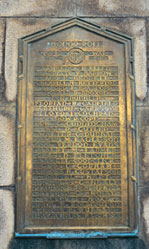
He quickly observed that the two pillars at the entrance to Memorial Way, which had been erected a few years previously, were supposed to have two bronze plaques listing the men who lost their lives in World War I, but the University didn't have enough money appropriated to complete the job. He thought it could be done for the amount we had available. .The two plaques were made and installed. A commemorative ceremony was held on Memorial Day 1930 attended by faculty and students including members of Scabbard and Blade. I am still honored to have participated in this small bit of UW history.
-Clifford Bartells, '30
LIVING IN RUSSIA
Living for two years in the Russian House on 45th Street was a special experience: practicing Russian in the kitchen, the TV room, the bathroom, 24/7: what a great way to put language into long-term memory. I still remember much of what I learned in those two years. The housemates were great-and from all over the world. We sang, played, ate and talked Russian together. I also have warm memories of the professors in the linguistics, classics and Germanics departments-the teachers were interesting, well prepared and caring individuals who not only taught well but also socialized with us. I recall playing on the linguistics soccer team which included students and professors-good times.
-Don Schafer, '90
THE MOST BEAUTIFUL CAMPUS IN THE COUNTRY
I can still recall with admiration the physical beauty of the campus as one looks in an easterly direction and sees at the same time the expanse of an unspoiled Lake Washington, the snow-capped mountains of the beautiful Cascades, the then primeval greenery of an uninhabited Mercer Island and the stimulating and refreshing view of the beautiful, snow-peaked Mount Rainier, a sight that remains vividly and refreshingly etched in one's mind decades later. I expect the University of Washington campus is one of the most beautiful in the country, which should constitute a challenge to its present leaders to keep it so.
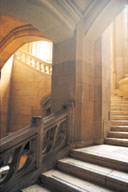
In addition, I recall with great fondness and admiration the Suzzallo Library. The library was not only the principal repository of books and periodicals but was also architecturally a work of art, with its imposing facade, its grand entrance, its winding stone staircase, leading up to the Main Reading Room, an expansive and welcoming atmosphere which seemed to extend a warm invitation to the multitude of earnest students who felt comfortable in its peaceful environs.
-Joseph Hasson, '43
PRICELESS MEMORIES
Walking from the Phi Delt house, crossing 45th Street, through the tree-lined walkways, then coming upon the cherry tree-lined "Quad." Frisbees everywhere, students getting sun, paradise. Strolling down to the fountain, taking in the ducks and Mount Rainer, never a more beautiful sight in the world. Crossing the bridge to Husky Stadium, Robb Weller leading us in attitude checks and Sonny Sixkiller throwing to Jim Krieg for 34 yards and a touchdown. Checking out the boats on Lake Washington coming into what Keith Jackson calls the most beautiful setting to watch a college football game. It still is! Bill Walton scoring over me, well, maybe not! The Ave., Dante's, Gillies East, Herfy's, the HUB, streaking, Vietnam, political unrest. This was what we all shared. For the students before us and those after us, no matter what year you graduated, we all shared the UW experience. Once a Husky, always a Husky.
-Ray Price, '74
CHANGING LIGHT BULBS
I obtained a part-time job changing light bulbs throughout the college streets and buildings for Mr. Everest of the college electric department. This job was under the auspices of the federal National Youth Administration. My most frightening light bulb replacement was at the curved end in the main reading room at Suzzallo Library. This light was only reachable through a small door out of the ceiling space and by stretching at arm's length that I could reach the light. It was 100 feet straight down to the library floor.
-Robert Madden
A PAGE OF HISTORY
I remember the lawn in front of the HUB and Jim Page on a sunny spring day. He would take his place and just start strumming and singing. He had his own repertoire-my favorite was "Ya Need a License for Your Permit"-but he was at his best when he made 'em up as he went.
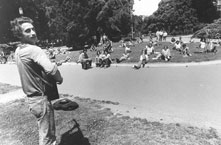
The passing parade of humanity provided him a never-ending series of inspirations for the next lyric that fascinated and held the growing crowds in a magical embrace of rhythm, song and laughter. Was he rap battlin' in a '70s sorta way?
-Tony Granillo, '79
Go To: Page 1 | Page 2 | Page 3